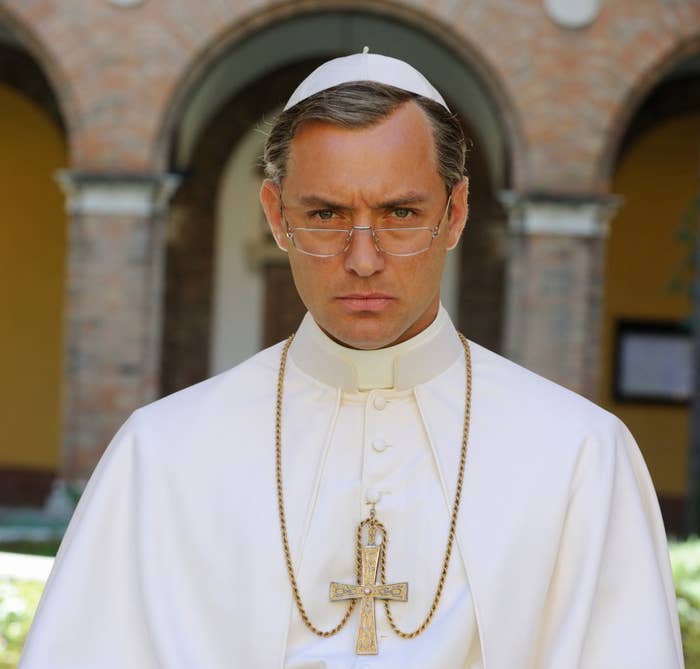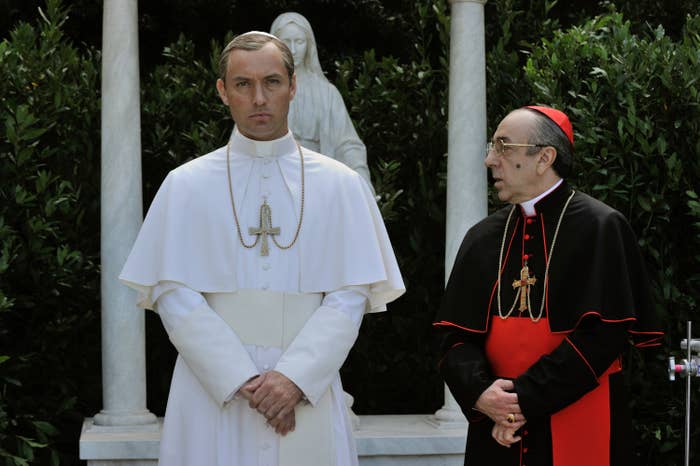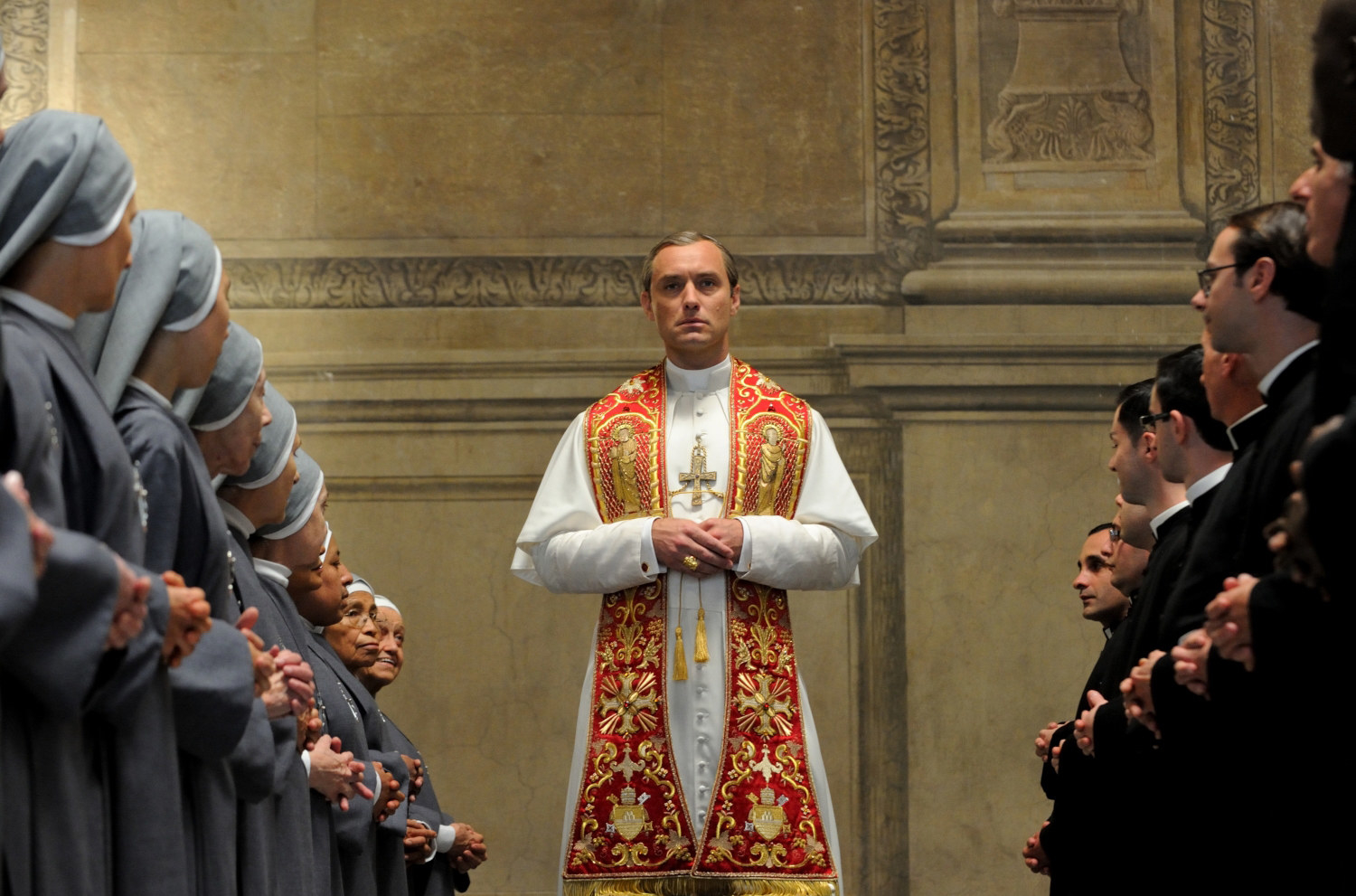
Thousands more people witnessed the glorious bloom of The Young Pope memes across Twitter this month than will probably ever watch the show. Why would they? The Jude Law–starring HBO satire about the internal workings of the Vatican isn’t the kind of must-see that’ll crash HBO Go upon premiere, even with a title that suggests its main character is not only a Young Pope but a Bad Pope. He smokes! He’s mean! He’s hot when he’s not supposed to be! He doesn’t fuck (at least not in the first five episodes of the 10-episode series available for review), but he seems like he could fuck, you know?
The Young Pope acquired an aura of camp thanks to the internet, but the reality of watching the show is weirder and darker and not especially fun, despite what’s promised by an opening credits sequence in which Law strolls down a hallway to a guitar-heavy theme song and winks at the camera. It’s the creation of Italian filmmaker Paolo Sorrentino, who in 2014 won the Best Foreign Language Film Oscar for The Great Beauty, but whose tendencies toward sumptuous visuals and light irony don’t benefit from being stretched over a languid 10-hour runtime with little by way of storytelling urgency. The Young Pope does throw what seems like what could be savage punches at the more absurd aspects of holy traditions and unholy political machineering going on within the Holy See. But if you’re not especially fluent in papal succession or Italy’s particular relationship with the Catholic Church, it’s not all that evident which of those punches lands.

However, you don’t really need to appreciate Pius XIII, played by Law, as commentary on the church’s real-life attempts to retain relevance in the 21st century while maintaining a tight grip on seriously calcified social and cultural creeds. Why bother, when Pius also works so well as an unintended stand-in for Donald Trump? Sure, the recent presidential election has turned the world into a fun-house mirror in which everything seems to reflect Trump in some warped way. It’s not that pop culture is suddenly all about the president-elect, but rather that the mere thought of him exerts a gravitational pull that realigns stories in your head to feel like commentary on the inescapably alarming state of the real world.
No reaching is required to see echoes of Trump in Pius XIII, born Lenny Belardo in the outer boroughs of New York City. In some ways, the two men are practically soulmates.
Lenny, you see, is also an outsider who was chosen for the position of pope unexpectedly. He was installed not by traditionally conservative or liberal branches of cardinals, but by power players behind the scenes, who hoped he’d be a malleable puppet. But Lenny turns out to be the opposite, a martinet who demands that everyone — including the nun who raised him in an orphanage, Sister Mary (Diane Keaton) — refer to him only as “Your Holiness.” He establishes spies among the ranks of the priesthood and takes pleasure in demanding his foes make him coffee, or kiss his feet, or be reassigned to a remote part of Alaska. He may be celibate, but he takes great care in reminding everyone around him that he has balls.
The Young Pope is so certain of himself as a politician that he doesn’t care who he alienates within the Vatican — “Your old methods only work on the old popes who were afraid of losing consensus,” he spits at Cardinal Voiello (Silvio Orlando), the secretary of state. He doesn’t care who he estranges among the faithful, either. His desire is to make the Catholic Church great again by taking it back a decade or 10, reinforcing or reinstating stances against homosexuality, abortion, and divorce — to make it less inclusive and open. “We have no reason to look out,” he declares, an assertion that may go against a long history of proselytizing, but falls in line with the current global trend toward metaphorical and literal wall-building.
Lenny is a character of monstrous ego and sudden, desperate doubt, a man hauling his childhood abandonment issues with him wherever he goes. The Young Pope portrays this detail as key to its main character’s psyche in air quotes, a psychological wound so obvious it feels both like a gag and uncomfortably on point. Lenny dreams again and again of his hippie parents deserting him via vaporetto in Venice. “Your personal aches, your enormous sufferings, your terrible memories... It’s a harsh thing to say, but I have to say it: They must take a backseat,” Sister Mary urges him as he settles into the role of pope. But sitting in one of the most powerful positions in the world doesn’t console Lenny; it just gives him higher ground from which he avenges himself against everyone he feels ever once slighted or betrayed him. He’s in the best possible spot to confirm that he’ll never fill the emptiness within.

The Young Pope, which Sorrentino wrote in 2014 and 2015 with Stefano Rulli, Tony Grisoni, and Umberto Contarello, obviously wasn’t scripted with Trump in mind. And there are ways in which the PEOTUS and Pius XIII seriously diverge: For instance, Lenny prefers a very un-Trumpian distance from his flock in terms of public appearances, insisting on invisibility and mystery (he cites Salinger, Kubrick, Banksy, and Daft Punk as inspirations). Whatever accidental but timely parallels there are between the real man and the fictional character have more to do with the specific human itch — to watch someone blow shit up — that The Young Pope happens to be scratching right as the United States is living with it.
The series’ appeal has everything to do with watching this outsider come crashing through an ossified system like a wrecking ball, refusing to follow the rules or set aside any personal pettiness, declaring war on anyone who defies him. It’s fiction that both mocks and indulges in the instinct to gawk at someone who does what they want and crushes anyone who’d stop them — someone who unabashedly wants power and unapologetically attempts to destroy his enemies. Which may be why The Young Pope doesn’t feel very funny upon viewing: It’s one thing to watch that character on TV, and another thing to dwell under that person’s boots.
